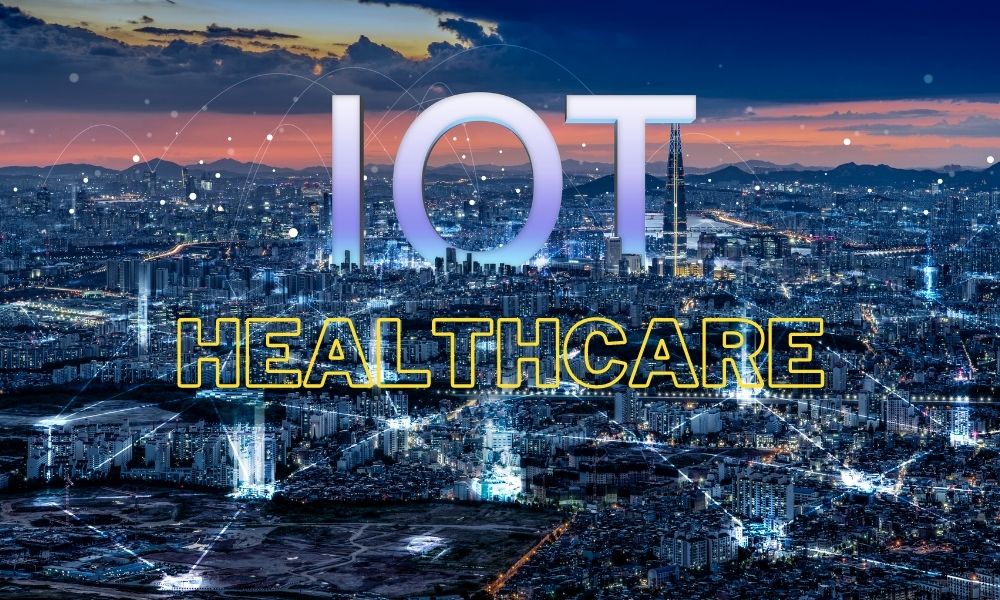IoT has a radical impact on the healthcare industry due to its application in patient monitoring and access to real-time data of patient’s body components. Moreover, sensor-enabled wearable devices help users to engage more with their health. Let’s glean more insights about IoT usage in the healthcare industry.
If you have heard of IoT technology, you would be acquainted with the fact that it can revolutionize almost every industry and make human life simpler, hassle-free, and luxurious.
But, the way it can impact healthcare is a phenomenon. Owing to its spectacular impact on the healthcare system, it is growing as major digital trends in the healthcare industry.
See Also: How AI Chatbots Are Digitizing Patient Care
Following are some statistics that show the expansion of IoT tech in healthcare:
- 70% of best-selling wearables are dedicated to wellness and healthcare.
- By 2026, 40% of IoT-driven devices will be used for healthcare.
- Per Mckinsey Global, IoT devices will boost the overall healthcare industry revenue by $4-11 trillion by the end of 2025.

All of these aspects indicate that investors will be more attracted to IoT-driven healthcare businesses, and more startups will pop up in the healthcare industry. Clearly, you would be enthralled to know more about digital healthcare and IoT applications.
The Expansion of Digital Healthcare
Digital health is a term that combines all modern technologies to serve patients with better care.
And, major technologies used in this practice are – artificial intelligence, wearables, mobile/ubiquitous, and other cybernetic technologies. Moreover, healthcare mobile app development is also booming rapidly.
The aim to include all of these technologies is improvement in disease diagnosis, monitoring, and managing long-term conditions and in short, transforming healthcare itself and wondering how IoT comes into the picture?
Let’s understand.
Why Is IoT important in Healthcare?
The concept of Internet of things is a catalyst in itself that empower devices infused with sensors to gather data from surrounding (such as the body of the patient), that gathered data is transfer over a network in real-time and AI-infused system process the data, generate the result, and transfer the result into the form of action or activity.
This way, smart wearable devices can be used tremendously to measure the aspects of the human body and conditions such as blood pressure, heart rate, temperature, body mass, burned calories, and more.
A number of smart wearables are already available in the market, such as:
- Wearable Fitness Tracker( Fitbits)
- Wearable Blood Pressure Monitors
- Smart Health Watches
- Wearable ECG Monitors
- Biosensors and more.
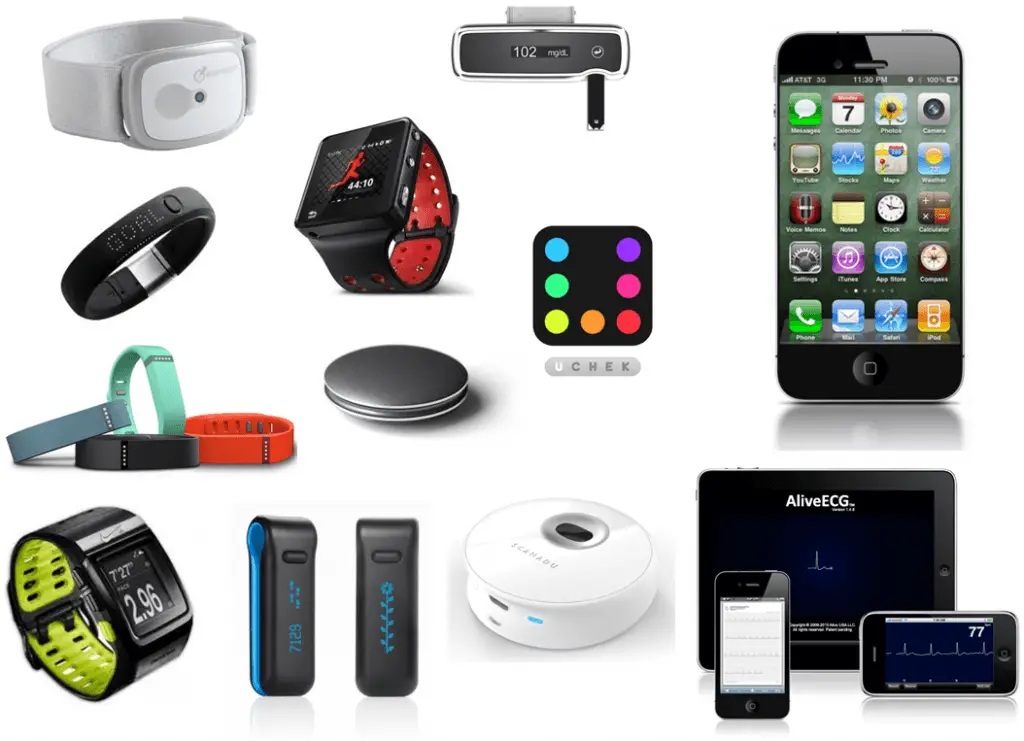
These devices are just showing the infancy of IoT usage in the healthcare technology market. The maturation of wearable technology is still far beyond one’s thinking. Moreover, the market will experience a huge expansion.
Some already presented research shows the significant surge in usage of fitness tracker app and other health-based wearables. Per Business Insider Intelligence Research, the total number of fitness trackers and healthcare wearables (installed ) will grow at a rate of 10% by 2023 and surpass 120 million installed devices.
The behavior of wearable technology driven by IoT helps in reducing hospital visits and readmissions due to poor management of health.
Besides, 75% of users have affirmed stated that wearables help them to engage with their own health.
3 Major Impacts of IoT in Healthcare:
1. Smart & Wearable Devices to Render Friction-Less Patient Monitoring
As I mentioned above, the market is brimming with different kinds of wearable technology and devices to keep track of human’s vital’s in real-time.
The major aspects of the human body that can be monitored through these devices include blood pressure, heart rate, and other physical activities.
These IoT devices will facilitate a speed-fast system for monitoring, collecting, and transferring patient’s data in real-time. This data will be accessible to patients, doctors, and insurance companies anytime, anywhere, or on any device.
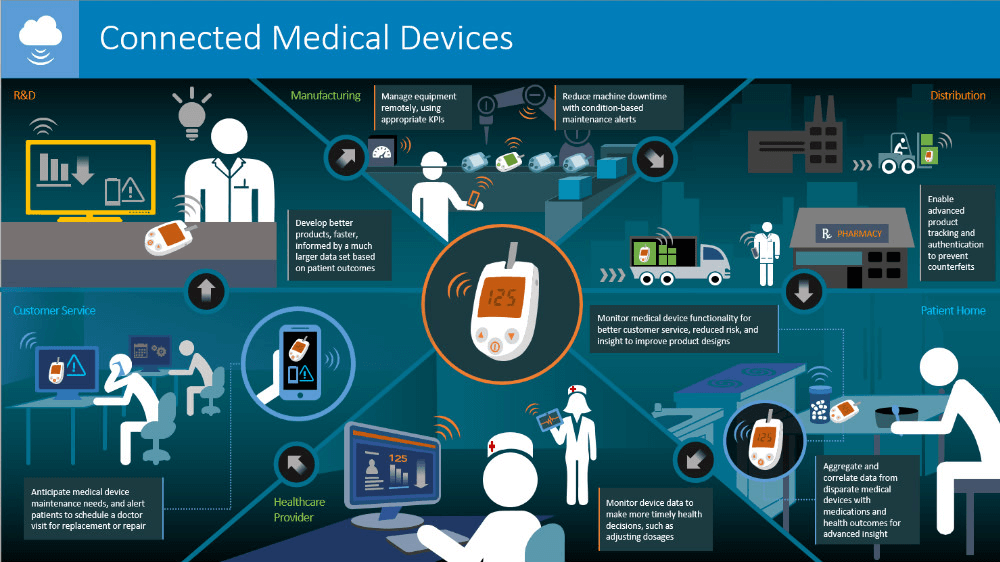
This real-time data can help in swift action to various emergencies such as heart attack, diabetes, asthma, and more. Using data, the physician can also keep an eye on the patient’s health (recorded previously) and make a better decision to cater treatment.
IoT (Internet of Medical Things) is a set of connected devices that monitor and measure the patient’s data in real-time and helps in providing better diagnostic and medical solutions.
See Also: How 5G Will Change the Smartphone Experience?
2. Smart Hospital Infrastructure for Quality, Compliance & Monitoring
Patient data is the major point of stress, especially when it is being managed over papers. Now, hospitals have started adopting the electronic health record system to manage their patient’s data. At the same time, sensor-driven machines in the hospitals can help in taking basic physical data of the patient and save it on record.
This way, the most updated data such as body temperature, heart rate, and much more would be available to physicians in the meantime. Besides, sensor-driven machines can also help in maintaining the hand hygiene of staff.
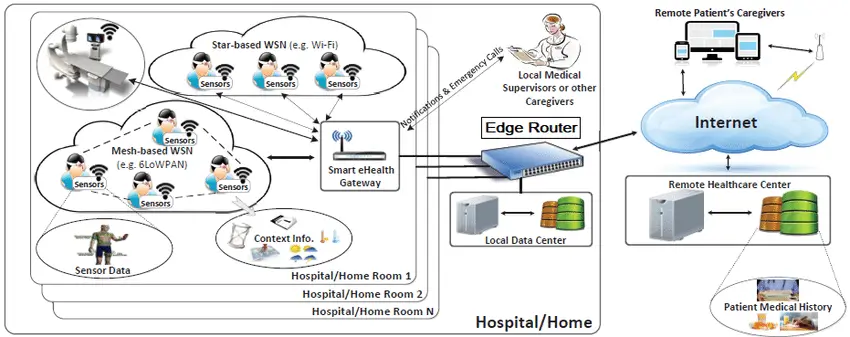
The Internet of things, with the collaboration of Cloud services, can also make patient data easily manageable and accessible.
Altogether, smart hospital infrastructure can turn out beneficial in terms of patient engagement, hospital assets tracking, streamlining communication between staff, workflow optimization, and more.
3. Remote Patient Care (Telehealth /Telemedicine)
IoT is enabling people to connect with any device virtually in any location, and here comes the remote patient care and monitoring in the picture.
It promotes an infrastructure for remote patient monitoring by enabling data capturing and monitoring devices using home-based and inter-connected devices.
All thanks to smart sensor technologies, AI, and the Internet, healthcare organizations now just can gather data but can leverage collected data in the best possible way to reduce wasteful costs. IoT-driven patient monitoring and care will result in the following ways.
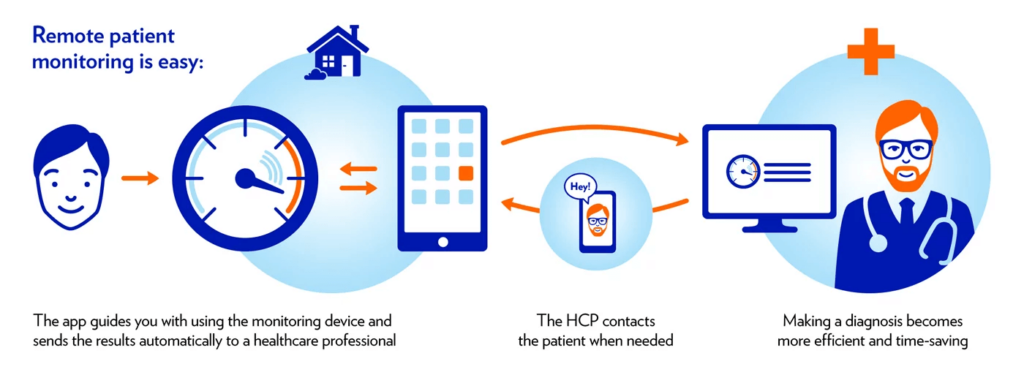
- Effortless and near-instant communication capabilities will improve the efficiency of patient care and result in inconvenience to patients.
- Automated systems for scheduling, in-person appointments, and automated bypassing will also make patient care swift by reducing facetime.
- Continuous monitoring can also result in predicting critical events that can lead to major life and death differences.
- Connected devices in a sophisticated GPS network can provide the prospect for early intervention for flagged patient conditions and can provide a faster and clearer picture in emergency situations.
- Moreover, patient data security and safety can be ensured within IoT systems.
Overall, Patient monitoring allows you to improve patient physical safety and also has been proven effective in fall prevention. Some hospitals are using RPM integration as a means to improve in-house data security efforts and integrate with EMR and meet HIPPA requirements.
Aside from these, you would experience completely revamped healthcare services and systems.
Let’s understand the future of healthcare with IoT technology.
The Future of Digital Health with IoT
IoT technology has a huge potential, and its usage in healthcare will turn out exceptionally revolutionary.
The significant changes you will see in the future with the infusion of IoT in healthcare can be faster disease diagnosis, plenty of data for medical research, accurate & faster discovery for treating patients with severe diseases, and more.
Some examples are:
- Digital Biomarkers To Capture Disease Symptoms: It will help in identifying chronic diseases, monitor them, and give a prospect of changes of body condition over time.
- Devices To Maintain Hygiene: Hygiene is a factor that can result in compromised patient care if not handled with care; sensor-driven devices can measure the hand hygiene of staff and alert them.
Apart from these, IoT will trigger closed-loop diagnosis for treatment by providing real-time data to both patient and doctor, which will result in better ailment diagnosis, drug prescription, and better patient care.
Moreover, remote health monitoring will also make healthcare services more cost-effective.
Related: How Will Artificial Intelligence Change the Future in Society?
Conclusion
IoT can significantly impact each and every process of the medical system, such as patient data management, patient care, disease diagnostic, and much more. Besides, it will significantly improve the healthcare system and reduce patient care costs for the betterment of humankind. Moreover, investing in IoT-enabled medical infrastructure would enable businesses to gain more profit. If you want to understand possibilities, you can connect with an IT software outsourcing company engaged in IoT development.
Ved Raj is the business analyst at ValueCoders that provides IT consulting and healthcare software solutions to healthcare providers worldwide.

